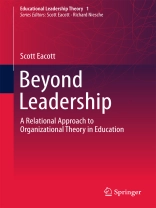This book systematically elaborates Scott Eacott’s “relational” approach to organizational theory in education. Contributing to the relational trend in the social sciences, it first surveys relational scholarship across disciplines before providing a nuanced articulation of the relational research program and key concepts such as organizing activity, auctors, and spatio-temporal conditions. It also includes critical commentaries on the program from key figures such as Tony Bush, Megan Crawford, Fenwick English, Helen Gunter, Izhar Oplatka, Augusto Riveros, and Dawn Wallin. As such, the text models an approach to, or social epistemology for building knowledge claims in relation rather than through parallel monologues.
Eacott’srelational approach provides a distinctive, post-Bourdieusian variant of the relational sociological project. Shifting the focus of inquiry from entities (e.g., leaders, organizations) to
organizing activity and recognizing how
auctors generate – simultaneously emerging from and constitutive of –
spatio-temporal conditions unsettles the orthodoxy of organizational theory in educational administration and leadership. By presenting its claims in the context of other approaches, the book stimulates intellectual debate among both relational sociologists and opponents of relational approaches.
Beyond Leadership provides significant insights into the organizing of education. As it does not fit neatly into any one field, but instead blends educational administration and leadership, organizational studies, and relational sociology, among others, it charts new territory and promotes important dialogue and debate.
Spis treści
Part I: The relational turn in contemporary thought and analysis.- 1 From 'leading’ to 'organizing’.- 2 The relational turn in the social sciences.- 3 Towards relations in educational administration theory.- Part II: The relational extensions.- 4 Embedded and embodied auctors.- 5 Beyond 'leadership’.- 6 The matter of context.- 7 Overcoming analytical dualisms.- 8 Productive thinking.- Part III: Dialogue and debate.- 9 Advancing the intellectual development of the field.- 10 Relational leadership: New thinking or established ideas in 'new clothes’.- 11 Relational goods, democracy, and the paradox of epistemic Privilege.- 12 Educational administration and the relational approach: Can we suffice contextual-based knowledge production.- 13 Productive conversations from a feminist perspective.- 14 Thinking relationally about the school leader.- 15 Engaging with educational leadership relationally.- Part IV: Moving forward.- 16 Responding to commentaries.- 17 Advancing the relational program.
O autorze
Scott Eacott is a relational theorist, director of the Office of Educational Leadership at the School of Education at the University of New South Wales (Sydney) and an adjunct professor at the University of Saskatchewan’s Department of Educational Administration. He has previously held positions at the University of Newcastle (Australia) and the Australian Catholic University. Scott’s work has been widely published, and his research interests and contributions fall into three main areas: i) developing a relational approach to scholarship; ii) educational leadership theory and methodology; and iii) social theory. He is a fellow of the Australian Council for Educational Leaders, former convenor of the Educational Leadership Special Interest Group of the Australian Association for Research in Education, a member of the national advisory board for the Australian Applied Management Colloquium, and he is on the editorial board of many of the field’s leading journals. Scott’s previous book, Educational Leadership Relationally, was awarded the 2015 Australian Council for Educational Leaders’ Hedley Beare Award for the most outstanding piece of educational leadership writing.












